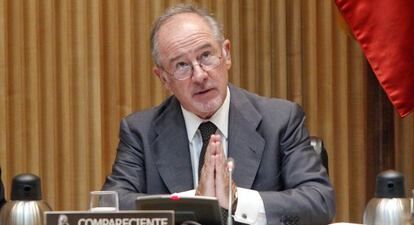Ex-IMF chief ordered to post €3m bond over Caja Madrid card abuse
Rodrigo Rato and ex-bank head Miguel Blesa both held responsible for corporate spending

Spain’s High Court has decided that responsibility for the decade-long abuse of corporate credit cards at struggling banks Caja Madrid and Bankia lies with their former presidents, Miguel Blesa and Rodrigo Rato.
Judge Fernando Andreu, who took testimony from the two official suspects in the case at a hearing on Thursday, ordered Blesa and Rato to pay bonds of €16 million and €3 million, respectively, to cover civil liabilities in the case, or else have their assets frozen.
The decision comes after Blesa and Rato – a former International Monetary Fund (IMF) chief – told the judge that the secret credit cards, whose existence showed up neither on job contracts nor bank statutes, were a salary bonus. Neither man was able to explain why the money was never declared in their tax returns.
They and 81 other executives and board members of Caja Madrid and its successor Bankia spent €15.5 million between 2003 and 2012 on alleged representation expenses that investigators found to have included trips to New York, African safaris, dinners at expensive restaurants, jewelry, clothing and cash withdrawals.
Blesa has said he is unable to come up with the €16 million in bond money and will likely face a freeze on all his assets, said sources familiar with the situation. The financier already struggled to post the €2.5 million bail set by a court in May to avoid prison in an ongoing investigation into his alleged mismanagement of Caja Madrid, which he headed between 1997 and 2010.
The investigation into the credit card abuse is part of a larger probe into Bankia, the lender that resulted from the 2010 merger of Caja Madrid and six other regional savings banks, which were all struggling during Spain’s economic crisis. Bankia itself was bailed out in 2012 by the state, which had to inject €22.4 billion into the floundering lender.
A third man, Ildefonso Sánchez Barcoj, who was Caja Madrid’s financial director, is also being targeted in the credit card investigation. Court documents show he spent €574,000 on his company credit card despite receiving an annual salary of over €2 million.
Neither man was able to explain why the money was never declared in their tax returns
Although bank bosses initially claimed that the credit cards were used for representation expenses, the investigating judge and the prosecutors never believed this version of events, and neither Blesa, Rato nor Barcoj attempted to uphold the theory. Instead, Blesa and Barcoj claimed the cards represented a flexible bonus on top of their official salaries, while Rato said that it was an integral part of his annual salary and deducted from the same.
Sánchez Barcoj described Blesa as an all-powerful president who made all the calls. “With complete certainty, who got a card and how much could be spent on that card were Blesa’s decisions,” he said. “Nobody declared their cards on their tax returns because the bank was supposed to do that.”
Blesa, who is being targeted in another investigation into the sale of preferred bank shares, said that giving out corporate credit cards to top bank officials was a custom dating back to 1988.
“I didn’t ask about the legal basis for these cards. It was simply a custom,” said Blesa, who is a tax inspector by trade.
Tu suscripción se está usando en otro dispositivo
¿Quieres añadir otro usuario a tu suscripción?
Si continúas leyendo en este dispositivo, no se podrá leer en el otro.
FlechaTu suscripción se está usando en otro dispositivo y solo puedes acceder a EL PAÍS desde un dispositivo a la vez.
Si quieres compartir tu cuenta, cambia tu suscripción a la modalidad Premium, así podrás añadir otro usuario. Cada uno accederá con su propia cuenta de email, lo que os permitirá personalizar vuestra experiencia en EL PAÍS.
¿Tienes una suscripción de empresa? Accede aquí para contratar más cuentas.
En el caso de no saber quién está usando tu cuenta, te recomendamos cambiar tu contraseña aquí.
Si decides continuar compartiendo tu cuenta, este mensaje se mostrará en tu dispositivo y en el de la otra persona que está usando tu cuenta de forma indefinida, afectando a tu experiencia de lectura. Puedes consultar aquí los términos y condiciones de la suscripción digital.








































